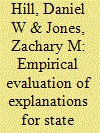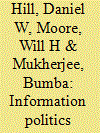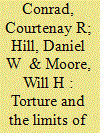| Srl | Item |
| 1 |
ID:
133949


|
|
|
|
|
| Publication |
2014.
|
| Summary/Abstract |
The empirical literature that examines cross-national patterns of state repression seeks to discover a set of political, economic, and social conditions that are consistently associated with government violations of human rights. Null hypothesis significance testing is the most common way of examining the relationship between repression and concepts of interest, but we argue that it is inadequate for this goal, and has produced potentially misleading results. To remedy this deficiency in the literature we use cross-validation and random forests to determine the predictive power of measures of concepts the literature identifies as important causes of repression. We find that few of these measures are able to substantially improve the predictive power of statistical models of repression. Further, the most studied concept in the literature, democratic political institutions, predicts certain kinds of repression much more accurately than others. We argue that this is due to conceptual and operational overlap between democracy and certain kinds of state repression. Finally, we argue that the impressive performance of certain features of domestic legal systems, as well as some economic and demographic factors, justifies a stronger focus on these concepts in future studies of repression.
|
|
|
|
|
|
|
|
|
|
|
|
|
|
|
|
| 2 |
ID:
120867


|
|
|
|
|
| Publication |
2013.
|
| Summary/Abstract |
''Information politics'' INGOs such as Amnesty International have incentives to maintain their credibility by carefully vetting information about rights abuses committed by governments. But they are also strategic actors that may inflate allegations of abuse to fulfill organizational imperatives. This raises an intriguing question: When are INGOs more likely to exaggerate their allegations? In answer to this question, we argue that news media reporting pressures INGOs to comment for organizational reasons, even if the information available to them is poor. On the other hand, higher numbers of domestic human rights NGOs increase the quality of available information, and INGOs will find more credible information provided about states as the winning coalition to the selectorate rises. Yet, an incentive to exaggerate allegations under certain conditions does not imply that INGOs will always do so. Indeed, there exists significant observed variation in INGO reports about government abuse. To test our hypotheses, we employ a zero-inflated ordered probit model with correlated errors that permits us to model an unobservable probability (the probability that the INGO exaggerates its allegations) and correct for potential bias. Results provide support for our hypotheses, and suggest that Amnesty International adheres to its credibility criterion, rarely succumbing to incentives to exaggerate abuse.
|
|
|
|
|
|
|
|
|
|
|
|
|
|
|
|
| 3 |
ID:
157580


|
|
|
|
|
| Summary/Abstract |
What are the limits of democracy’s positive influence on human rights? In this article, we argue that contested elections and powerful courts provide leaders with different incentives with regard to hiding torture. Because government torture is generally targeted at individuals that voters find threatening, institutions that reflect public opinion – like electoral contestation – are associated with higher levels of government abuse that leave scars on the victim’s body. Other institutions – like powerful courts – protect the rights of political minorities. Leaders in countries with powerful courts prefer plausible deniability of rights violations and consequently employ higher levels of clean torture, which leaves no scars. We test our hypotheses using data from the Ill-Treatment and Torture (ITT) Data Collection Project that distinguish between Amnesty International (AI) allegations of scarring and clean torture. We employ an undercount negative binomial that accounts for AI’s (in)ability to obtain information about torture. The model assumes that some incidents of torture go unreported and allows the extent of underreporting to vary across countries/years. Estimates from the model yield considerable statistical and substantive support for our hypotheses.
|
|
|
|
|
|
|
|
|
|
|
|
|
|
|
|
| 4 |
ID:
160768


|
|
|
|
|
| Summary/Abstract |
This study examines a government’s decision to cede authority over fundamental questions of policy to international organizations. Explanations for delegation to international institutions focus on the benefits of “locking in” domestic political institutions and signaling intentions to the public. This line of reasoning suggests that partly democratic and democratizing governments have the strongest incentive to participate in international human rights institutions. I evaluate this claim by analyzing patterns of participation in two regional human rights courts: the European Court of Human Rights and the Inter-American Court of Human Rights. The decision to join a regional court is a more valid indicator of delegation than those used in previous empirical studies and to date has not been examined in systematic fashion. I find strong evidence in support of the claim that governments grant authority to institutions to credibly commit to maintaining democracy.
|
|
|
|
|
|
|
|
|
|
|
|
|
|
|
|